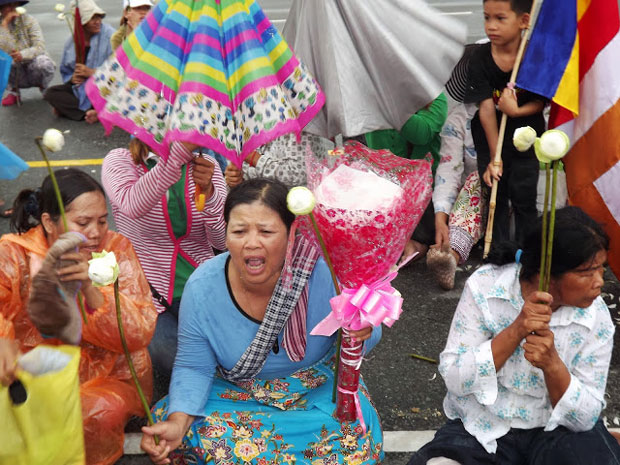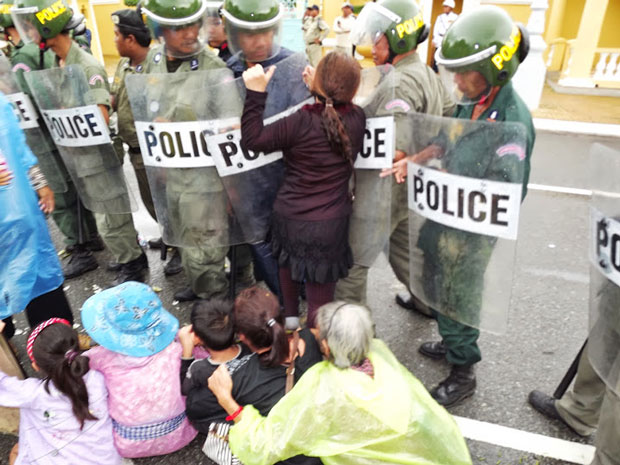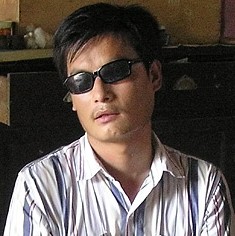18 Jun 2013 | Asia and Pacific, News

Protesters — mostly women and children — called for the release of activist Yorm Bopha outside the Royal Palace before being victimised by the police. (Photos: Marek Marczynski / Index on Censorship)
In Phnom Penh, Cambodia, for the IFEX General Meeting and Strategy Conference 2013, Index Director of Campaigns and Policy Marek Marczynski reported back on the manhandling of protesters outside the Royal Palace.
“The use of violence against the demonstrators today was clearly disproportional and unlawful. The authorities instead of cracking down on people exercising their freedom of speech and assembly should listen to their legitimate concerns. It is disturbing that as the global civil society meets in Phnom Penh today to discuss challenges to free expression the authorities apply such brutal measures to suppress this basic right”, Marczynski said.
Here is Marczynski’s full account:
I am in Phnom Penh, where I am attending the 2013 General Meeting of IFEX (International Freedom of Expression Exchange) which is a global network of organisations working together to defend and promote freedom of expression world-wide. Today, following the morning discussions I decided to take a walk to see the Royal Palace, one of the many examples of the beautiful Khmer architecture.
As I approached the main entrance to the palace I saw a group of about 40 people chanting slogans and holding flowers. Some of them were kneeling. Most of them were women and young children. I soon realised that they were demanding release from prison of Yorm Bopha, a land rights activist.
Yorm has been detained since September 2012, allegedly in relation to planning of an assault on two men in August 2012. In December 2012, after a trial which Amnesty International described as unfair, Yorm was sentenced by the municipal court in Phnom Penh to three years in prison on charges of “international violence with aggravating circumstances”. The conviction was upheld on 14 June 2013 by the Cambodian Supreme Court but her prison sentence was reduced to two years.
Prior to her arrest, Bopha had been campaigning against forcible eviction of thousands of people from the area of Boeung Kak Lake in Phnom Penh which was leased to a private company in 2007.
Today’s protest was calling for her immediate release. The participants were holding placards with photos of Bopha who has been proclaimed a prisoner of conscience by Amnesty International.
Though the protest was peaceful, there was a large police presence on the street, which was closed to traffic. Around 100 policemen were waiting nearby.
At about 3:40pm the police began cordoning off the gathering. I could not actually understand why they were doing this as the group of women and children were not causing any problems. It was just a cheerful gathering chanting and holding flowers.
The atmosphere changed quickly. Although I don’t speak Khmer I could sense that it was tense. Soon after, the police started pushing the protesters, some of whom were still kneeling, away from the palace.
Initially the protesters did not react and stayed put. The police however quickly became violent. Some police officers started dragging the protesters and pulling their placards. One of the police officers wearing a mask was particularly violent, punching some of the women.

The violent confrontation lasted for another hour during which two women, after being pushed by the police, fainted.
For updates from #ifex13, follow @MarekMarczynski
18 Jun 2013 | Egypt, Middle East and North Africa, News

Photo: Shutterstock
A proposed bill in Egypt outlawing violence against women has now been proposed by the country’s National Council for Women. But is it a step forward in tackling the silence around sexual harassment in the country? Shahira Amin reports
Egypt’s National Council for Women (NCW) has submitted a draft law addressing all forms of violence against women to the Shura or Consultative Council, the country’s lower house of parliament.
The proposed law would criminalise violence against women, including forced marriage, trafficking, female genital mutilation, and sexual harassment in its many forms. The law also includes provisions encouraging victims to report incidents of harassment and assault, while ensuring their protection.
The draft came at the request of Prime Minister Hisham Qandeel, after a rise in the number and intensity of sexual assaults at protests. The violence peaked earlier this year, when 25 female protesters were the victims of mob violence and sexual assault during protests in Tahrir Square on the second anniversary of the 2011 mass uprising.
Sexual harassment is a daily reality for the majority of Egyptian women: a UN report released April 2013 estimated that 99 per cent of Egyptian women have been subjected to some form of harassment.
If passed, the law will be a step towards addressing Egypt’s crippling culture of self-censorship around violence against women.
Social stigma around sexual assault and rape has been a barrier in speaking out in Egypt’s conservative society, but this taboo has been actively challenged since the fall of former President Hosni Mubarak more than two years ago.
“Because a girl’s chastity is linked to family honour, women were either too ashamed to report the incidents to the police for fear of being stigmatised or they blamed themselves for causing the harassment or assault believing it may have happened because they were not dressed modestly enough or were out at a late hour,” explained Nehad Abou Komsan, head of the Egyptian Center for Women’s Rights.
“With the fear barrier gone and in the freer post-revolution environment however, more women are coming forward to report assault or rape incidents. That is the positive change that the revolution has brought: the silence has been broken,” she told Index. The provision guaranteeing protection for witnesses to assault incidents will also encourage them to come forward with their testimonies instead of turning a blind eye to such incidents, she added.
Egypt has seen a surge in violence against women post-revolution, sparking a more emboldened movement against sexual harassment, which some have alleged to be politically motivated. Movements like Tahrir Bodyguard and Harassmap have formed in order to address and speak out against sexual harassment. Women have been more vocal in speaking out in the media, and giving graphic accounts of their experiences.
NGO Nazra for Feminist Studies has explained the surge in violence against women post-revolution as “a continuation of the ousted regime’s policies and part of attempts by the various security agencies and the remnants of the former regime to keep women away from the public sphere.”
While rights campaigners hail the draft law on violence against women as “a major step in the right direction”, they say legislation alone will not end violence.
Fatma Khafagy, NCW ombudsman said that “what is needed is a change in the mindset of both women and men. Men have to learn to respect women as equal partners in society, while women have to realise that they should not tolerate violence in any form”, said Khafagy. Changing attitudes will take time, she noted, adding that “what is important is that the process has started .”
While rights advocates hail the bill as “timely”, they fear that the Islamist-dominated Shura Council may block the bill on the grounds that it may be seen as violating Sharia or Islamic law.
In March this year, the Muslim Brotherhood issued a controversial statement during this year’s Commission on the Status of Women (CSW) rejecting the document drafted on eliminating violence against women, saying that it included articles that “contradict the principles of Islam and destroy its ethics”.
The Muslim Brotherhood’s stance was quickly condemned by the NCW.
18 Jun 2013 | In the News
CHINA
Chinese Studio Head Wang Zhonglei Discusses Censorship
Originally, Huayi Brothers was set to launch its 2013-14 slate at Cannes – but somehow plans changed and the company decided to unveil its slate in a lavish press conference a day before the opening of the Shanghai International Film Festival’s market. It’s a pretty diverse mix: two dark Jackie Chan films and left-of-field projects from non-mainland and young directors – not to mention the earlier-announced presence of David Ayer’s Fury, a Brad Pitt-headlining World War II drama about U.S. soldiers in a tank trying to fight off their German counterparts.
(The Hollywood Reporter)
ECUADOR
Ecuador: End Assault on Free Speech
The Communications Law that the Ecuadorian National Assembly approved on June 14, 2013, seriously undermines free speech. The law includes overly broad language that will limit the free expression of journalists and media outlets.
(Human Rights Watch)
EUROPEAN UNION
US cyberspying damages trust, European Union leaders say
Europe’s top privacy watchdog and the digital agenda commissioner both said Monday that more transparency and trust is needed between the European Union and the U.S. following reports of widespread data collection by the U.S. National Security Agency.
(PC World)
GERMANY
DW – a broadcaster in its prime
Deutsche Welle has celebrated its 60th anniversary, with speakers affirming the broadcaster’s commitment to freedom of expression and for shaping Germany’s global image.
(DW)
LIBYA
In Libya, chaos is taking a toll on freedom of press, speech
Shortly after Libyan leader Moammar Gadhafi was toppled in 2011, a 31-year-old activist had a tattoo put on his arm with the date marking the start of the uprising and rebranded himself a journalist.
(The Kansas City Star)
MEXICO
Is the Mexican Government Failing to Protect Journalists?
Anabel Hernandez thinks so, and fears for her life
(VICE)
TURKEY
Turkey’s Deputy Prime Minister Bulent Arinc threatens to dispatch army to quell protests
Thousands take part in rallies across the country to demand an end to the police crackdown
(The Independent)
BBC ends Turkish partnership in censorship row
As the protests in Istanbul against the Turkish Government show no signs of abating any time soon, the BBC has become embroiled in a censorship row with Turkish nationwide television news channel NTV to whom it supplies content.
(Rapid TV News)
UNITED KINGDOM
MoD serves news outlets with D notice over surveillance leaks
Defence officials issued a confidential D notice to the BBC and other media groups in an attempt to censor coverage of surveillance tactics employed by intelligence agencies in the UK and US.
(The Guardian)
Demonstrating “a load of cock” to censorship-crazed UK MP Claire Perry
The British Government is determined to be seen to be doing something (anything, really) about pornography online. The current incarnation of “something must be done; there, we did something!” is based on blaming “Internet companies” for not doing enough to prevent children from seeing porn, and demanding an expansion of the existing program of blocking a secret and unaccountable blacklists.
(Boing Boing)
UNITED STATES
Communication surveillance undermines privacy, freedom of expression
The widespread use of surveillance technologies to monitor peoples’ communications violates the human rights to privacy and freedom of expression, the UN’s Special Rapporteur on Freedom of Expression and Opinion stated in his report.
(The Final Call)
Gagged by Big Ag
Horrific abuse. Rampant contamination. And the crime is…exposing it?
(Mother Jones)
OR lawmakers to Congress: Corporate political spending shouldn’t be free speech
The Oregon Legislature is considering a proposal that urges Congress to amend the constitution to say that corporations do not have the same rights as people.
(NW Watchdog)
Freedom of Speech on Campus Threatened by Departments of Education and Justice Policy
Alliance Defending Freedom sent the U.S. Departments of Justice and Education a letter Thursday explaining the constitutional problems with an administration “sexual harassment” policy agreement that will serve as a “blueprint” for colleges and universities throughout the country. A coalition of religious, conservative, and independent student and faculty organizations signed the letter.
(Catholic Education Daily)
More Free Expression in the News
June 17 | June 14 | June 13 | June 12 | June 11 | June 10
17 Jun 2013 | Academic Freedom, Asia and Pacific
 Chinese dissident Chen Guangcheng has confirmed allegations that he was booted from his post at New York University, thanks to pressure from Chinese authorities on the university.
Chinese dissident Chen Guangcheng has confirmed allegations that he was booted from his post at New York University, thanks to pressure from Chinese authorities on the university.
“As early as last August and September, the Chinese Communists had already begun to apply great, unrelenting pressure on New York University,” Chen said in a statement released today.
The university is currently planning to launch a campus in Shanghai in the autumn — and according to the New York Post, Chinese officials tied to the project were unhappy with Chen’s presence at NYU. The blind activist and self-taught lawyer joined NYU as a student in its US-Asia Law Institute in May 2012, following a heroic escape from house arrest to Beijing’s US Embassy last year.
Chen also warned that that pressure from China’s ruling party in US academic circles is “far greater than what people imagine”, adding that “academic independence and academic freedom in the United States are being greatly threatened by a totalitarian regime.”
NYU has rejected Chen’s claims, saying that his fellowship was always planned to be a year-long one, and that “its conclusion have had nothing to do with the Chinese government.”
Chen, a vocal critic of China’s one-child policy and forced abortions, was placed under house arrest in 2005 after bringing a class-action lawsuit against the authorities of Linyi, a city in the eastern province of Shandong for its enforcement of the policy. He was eventually given a four year and three month jail sentence on charges of disturbing public order in 2006. He was released in 2010 and placed under house arrest once more, before his escape last year.
Sara Yasin is an Editorial Assistant at Index. She tweets from @missyasin.




 Chinese dissident Chen Guangcheng has
Chinese dissident Chen Guangcheng has